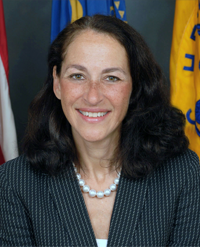By: Margaret A. Hamburg, M.D.
With the presidential inauguration just days away, it’s an exciting time to be in Washington, D.C. The police are setting up parade routes and security. Hotels and restaurants are bracing for crowds.
 And the FDA is playing an important part as well. For certain events of national significance, such as U.S.-based Olympic games, national political conventions and U.S.-hosted summits of world leaders, we are called upon to marshal our expertise. This week, at the request of the U.S. Secret Service and D.C. Department of Health, we’ve assembled a team of 35 FDA staff from across the U.S. including 18 experts in retail foods and field inspection. Their mission? To work closely with the D.C. Department of Health, local county health departments in Maryland and Virginia, and the FDA Baltimore District Office to make sure that the food served at the inaugural ceremony and parade, balls and galas is safe to eat.
And the FDA is playing an important part as well. For certain events of national significance, such as U.S.-based Olympic games, national political conventions and U.S.-hosted summits of world leaders, we are called upon to marshal our expertise. This week, at the request of the U.S. Secret Service and D.C. Department of Health, we’ve assembled a team of 35 FDA staff from across the U.S. including 18 experts in retail foods and field inspection. Their mission? To work closely with the D.C. Department of Health, local county health departments in Maryland and Virginia, and the FDA Baltimore District Office to make sure that the food served at the inaugural ceremony and parade, balls and galas is safe to eat.
When you think about it, it’s not such an unusual role for FDA. After all, the agency works hand-in-hand each day with state and local public health agencies throughout the U.S. to ensure food safety.
And that’s what we’ll be doing this week. Our team of regional food experts will work with local health departments to protect food from contamination. We’ll review menus and observe food preparation, storage and service. We’ll train kitchen staff about risk factors, such as cleanliness, food temperatures and refrigeration. And information on food sources and supply chains at venues and vendors will be questioned so that if any foodborne illness is reported, we’ll have data to trace it back to the source.
Data from the 2009 inauguration tells us that our inspections covered more than 100,000 meals. We expect similar coverage this time around.
It’s a privilege and an honor, but it’s also an enormous responsibility. Fortunately, we come prepared. We tackle this important challenge armed with years of valuable knowledge and experience in careful, data-based, cutting-edge science. We protect Americans from foodborne illness based on lessons learned over a long period of time.
In ancient Rome, the emperors had special food tasters to make sure their feasts were safe and poison-free. Washington, D.C., isn’t ancient Rome, of course, and the “poisons” we are looking out for may be dangerous microbes.
But just as the Secret Service is responsible for overall security at the inaugural events, FDA is responsible for managing food safety and security in the retail food venues. We’ll work with the chefs and food services and facilities staff in D.C. to ensure that food safety standards are met. As the FDA Food Safety Modernization Act makes clear, our focus will be on preventing food safety problems before they happen.
The standards that FDA and our local health departments will be enforcing in the nation’s capital are the same as those we have in place every day for you and your families. Whether the lucky guests are at an inaugural ball or eating at a stand along the parade route, they can rest assured – as can you - that the regulations are the same for both, and that FDA is doing its part to help ensure that the food we all eat will be safe.
Margaret A. Hamburg, M.D., is the Commissioner of the Food and Drug Administration

